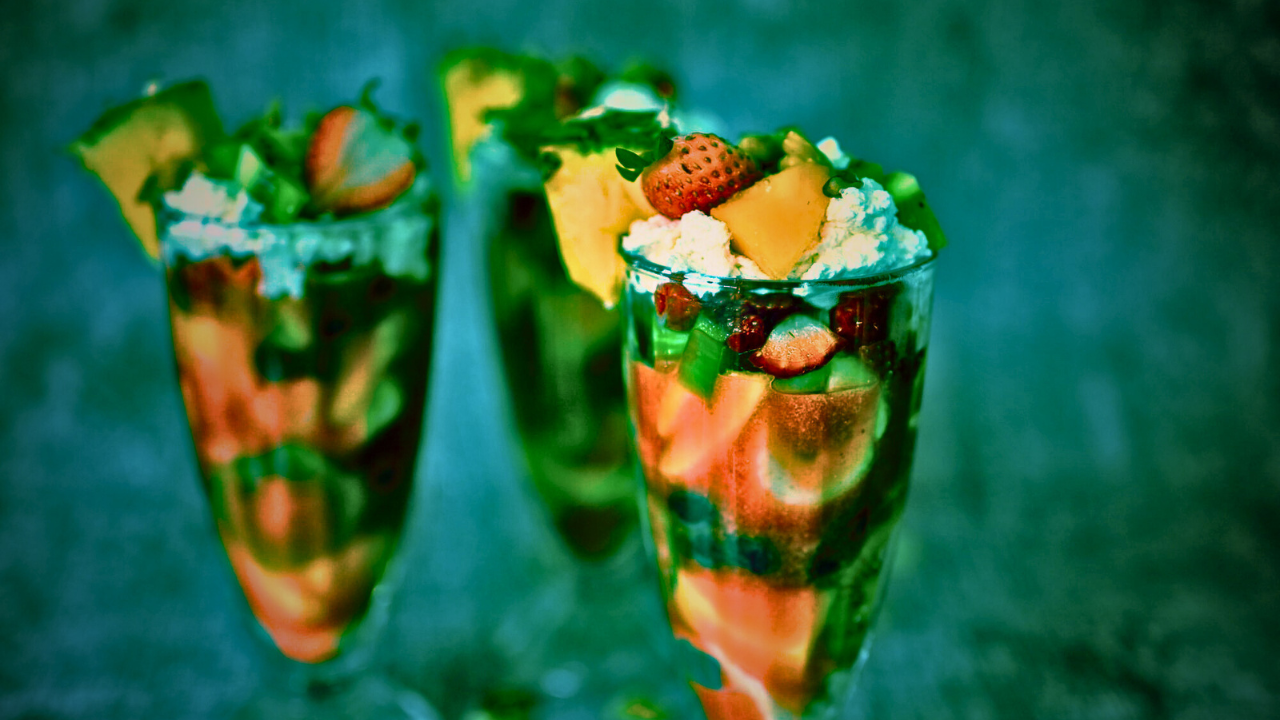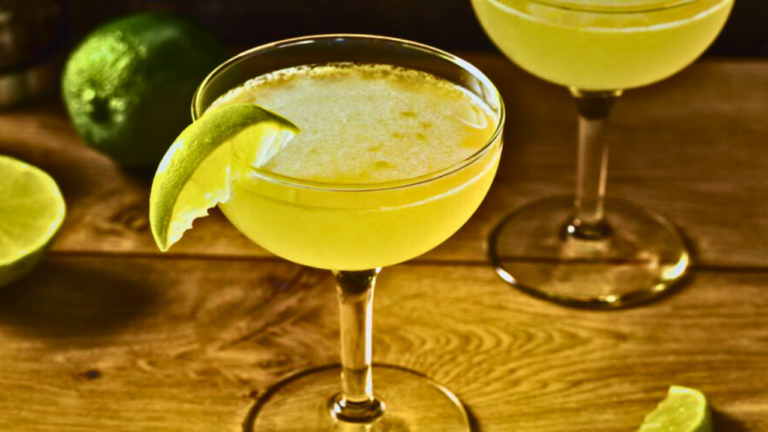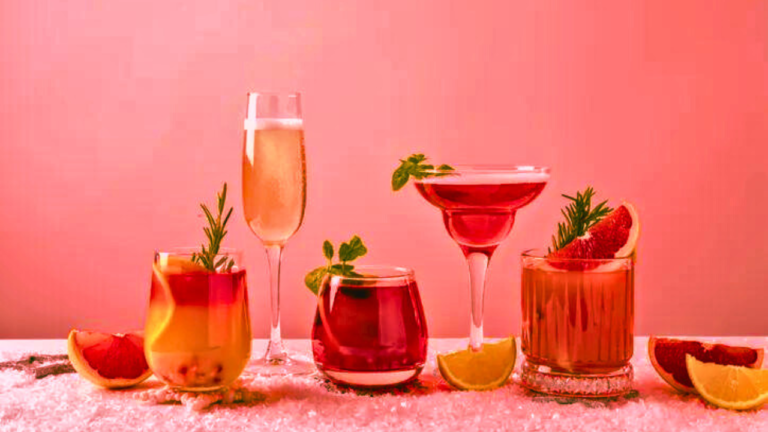What Fruit Is In Fruit Cocktails?
If you’ve ever wondered about the colorful concoction that’s nestled in your cocktail glass, garnishing your drink, or sweetening your salads and desserts, you’ve come to the right place. We’re about to embark on a fruity journey—decoding the delights of fruit cocktails. Because who doesn’t enjoy a spirited splash of vibrant fruits in their many forms and fusions?
What exactly goes into the making of that beautifully layered, color-splashed fruit cocktail? You might have an inkling of an idea with those customary chunks of pineapple, peaches, pears, cherries, or a number of other equally delicious alternatives. Still stuck on the choices? Don’t worry! We’re here to explore this topic in detail.
Note: While we often think of alcoholic beverages when we hear the term ‘fruit cocktail’, it’s a term that’s also popularly used to refer to a mix of diced, often canned fruits. You’ll often find fruit cocktails gracing everything from your breakfast cereals and salads, to desserts and drinks.
- Fruit cocktails: the festivities in a can or glass.
- Composition: What goes into the making?
- Varieties and combinations: an eternal love story with versatility.
- Seasonal delights: Nature’s calendar brings an exclusive menu.
- Health benefits: Tastes great and does good—a rare, perfect blend.
Let’s get started, shall we? Brace yourselves for a fructose-fueled exploration!
Read also: What Orange Juice Is Best for Cocktails?
What is the typical composition of a fruit cocktail?
Drinking a fruit cocktail can almost feel like taking a tropical vacation, right? But have you ever stopped to think about what’s in the glass? Let’s dig a little deeper.
A typical fruit cocktail consists of a mix of fruits, often including syrup or juice. The fruits used can vary widely, but generally include any combination of:
- Peaches
- Pears
- Cherries
- Grapes
- Pineapples
The syrup typically used in canned fruit cocktails is usually a mixture of water, sugar, and a form of preservative. The role of the syrup is to preserve the fruit and maintain its flavor over time. The specific amount of syrup can again vary, but it usually comprises between 20% and 45% of the total cocktail by volume.
Usually served cold, fruit cocktails are commonly consumed straight from the can, but they can also be incorporated into various dishes for extra flavor. Whether you use it in desserts or as an addition to your breakfast, a fruit cocktail can add a refreshing fruitiness to your meal.
However, it’s important to note that the specific composition of a fruit cocktail can depend on many factors, such as the producer’s recipe, the season, and even geographical location. Therefore, different brands and types of fruit cocktails can have slightly different compositions.
A typical nutritional breakdown of a fruit cocktail might look like this:
| Component | Amount per 100g |
|---|---|
| Calories | 82 |
| Protein | 0.9g |
| Fat | 0.2g |
| Carbohydrate | 21g |
So there you have it—the inside scoop on what’s inside your fruit cocktail!
Are there any specific fruits that are commonly used in fruit cocktails?
You bet there are! Fruit cocktails are usually a mix of several fruits, but there are definitely a few favorites that regularly show up in the mix. Let’s explore them:
- Peaches: Known for their sweet, juicy flavor and soft texture, they provide a lovely anchor to any fruit cocktail.
- Pears: Pears are a common addition, matching well with many other fruits due to their delicate and slightly tangy flavor.
- Pineapple: This tropical fruit offers a sharp, tangy note that works perfectly to balance the overall sweetness of the fruit cocktail.
- Cherries: Often used as a garnish, cherries add a bold color and distinctive flavor that round out a fruit cocktail.
Now, you might have noticed that these fruits often find their way into canned fruit cocktails. Why is that, you might wonder? The reasoning is pretty simple! Fruits like peaches and pears retain their texture and color well even when canned, while pineapple offers a welcome acidity to balance out the sweetness of the syrup. Cherries, with their vivid red hue and tart flavor, act like the cherry on top of this fruity dessert!
And while the above fruits tend to be the most common, the beauty of a fruit cocktail is its versatility. You might find different mixes in various parts of the world, depending on locally available fruits.
Read also: What Are The 5 Most Popular Cocktails?
Can fruit cocktails be made with a variety of fruits, or are there specific combinations?
Just as food recipes are diverse and limitless in combinations, the same goes for fruit cocktails. You aren’t constrained to a specific formula or combination of fruits when crafting a fruit cocktail. However, some cocktails are more recognized by certain combinations of fruits, and these combinations are often based on taste, texture, and color contrasts for an appealing drink with a balanced flavor.
Here are some recommended combinations to start you off:
- Citrus Twist: A delightful mixture of oranges, grapefruits, lemons, and limes. The tangy and sweet blend is a tastebud-pleaser and an excellent source of Vitamin C.
- Tropical Temptation: A vibrant and sweet blend of pineapple, mango, kiwi, and passionfruit. This combination gives you a quick escape to a tropical paradise with every sip.
- Berry Blast: A bold and tasty mix of strawberries, blueberries, raspberries, and blackberries. This combo packs an antioxidant punch and a vibrant color scheme.
It looks tempting, right? Feel free to mix and match these combinations based on your personal preference. You’re in the driver’s seat here. And remember, the aim is to have fun while combining different fruits to create your unique blend.
Pro Tip: While making a fruit cocktail, think about not just the taste but also the texture and color of your fruits. Try mixing fruits with different textures and colors for a more pleasurable experience!
Also, if you’re planning on adding a little extra kick to your fruit cocktail, a shot of your favorite liquor or spirit can be an interesting addition. Alcohols like rum, gin, vodka, or tequila can add a whole new dimension to your refreshing fruit cocktail.
Are there any seasonal fruits that are commonly used in fruit cocktails?
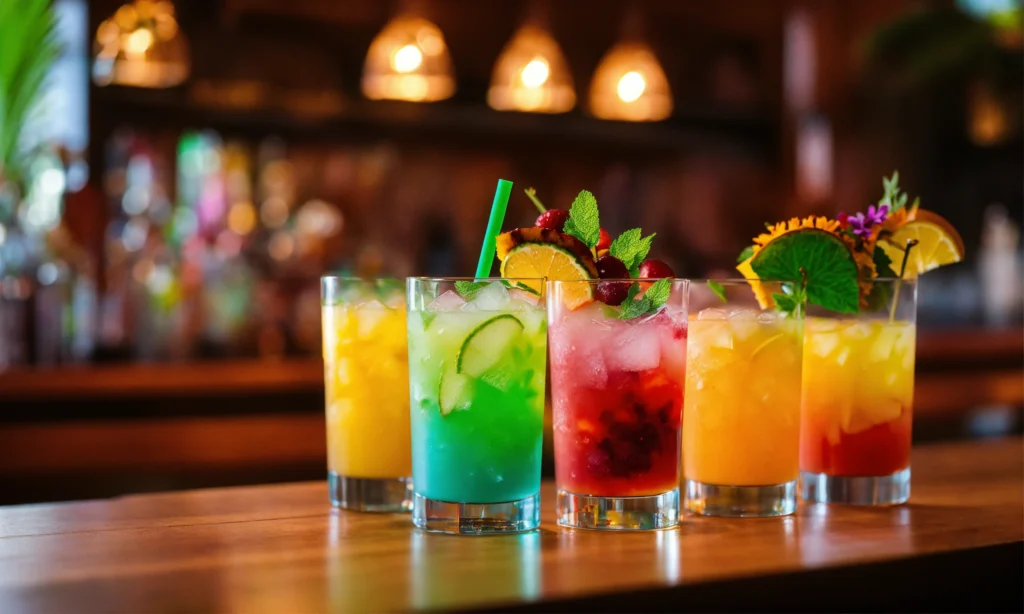
Certainly, seasonal fruits play a significant role in the construction of a delicious and refreshing fruit cocktail. Often, these seasonal varieties can transform an ordinary fruit cocktail into a vivid celebration of the season’s freshest produce. Whether it’s the sweet strawberries of summer or the crisp apples of fall, incorporating seasonal fruits into your fruit cocktail can truly elevate the cocktail’s taste and nutritional profile.
- Spring: In spring, fruits like strawberries and pineapples come into season. These fruit varieties can add a vibrant tartness and sweetness to your fruit cocktails, making them perfect for springtime soirees or picnics.
- Summer: Summer ushers in a bounty of vibrant fruits such as juicy watermelons, tangy raspberries, sweet peaches, and tasty blackberries. Their fresh and juicy flavor profiles are an instant hit in any refreshing summer fruit cocktail.
- Fall: Autumn is all about crisp and comforting fruits like apples and pears, which can bring a touch of warmth and heartiness to fall-themed fruit cocktails.
- Winter: Citrus fruits like oranges, grapefruits, and blood oranges, native to the winter season, can bring a refreshing tang and burst of vitamin C to your winter fruit cocktails.
So, next time, when crafting a fruit cocktail, think seasonally! Embrace the variety and unique flavors each season has to offer. Remember, optimal ripeness translates not just to superior flavor but also maximum nutritional benefits. Every sip you take will be a celebration of that particular season, offering a fresh, delicious, and wholesome treat.
Are there any health benefits associated with the fruits used in fruit cocktails?
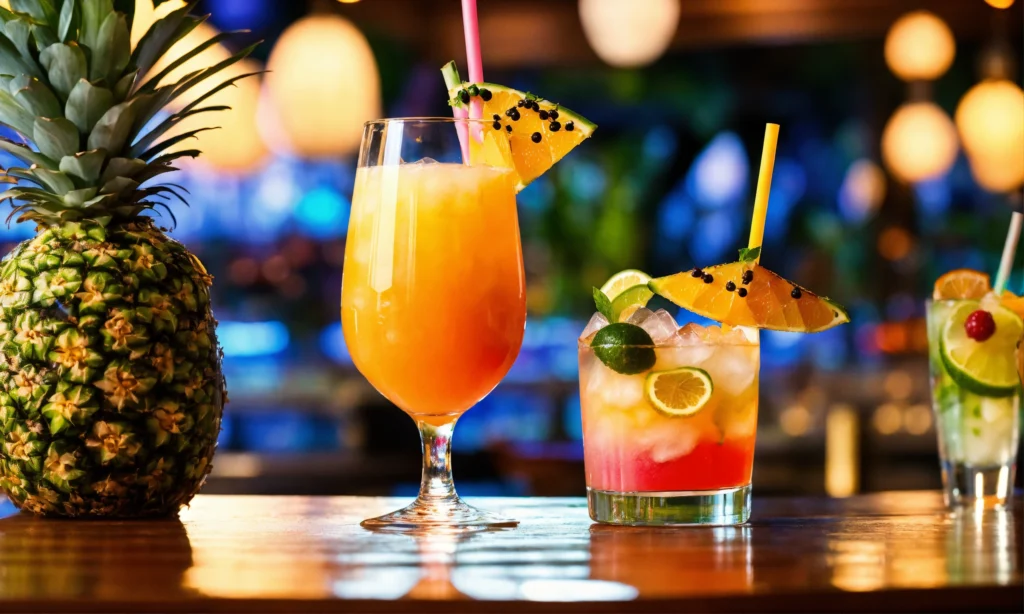
Indeed, there are a myriad of health benefits associated with the fruits commonly found in fruit cocktails. Let’s delve into the nutritional gifts some of these fruits offer.
Peaches, often a staple in fruit cocktails, carry a good dose of vitamins A and C. They are also rich in antioxidants that can help fight off harmful free radicals. The fiber found in peaches can aid digestion, ensuring that your bodily functions run smoothly.
With pears, you also get vitamins A and C, as well as copper and potassium. Pears provide dietary fiber, which not only keeps your gut health in check but also aids in controlling your cholesterol levels.
Cherries are chock-full of antioxidants and anti-inflammatory compounds. In fact, eating cherries can reduce inflammation and the symptoms of arthritis and gout.
Overall, the fruits in cocktails can contribute to your daily recommended intake of nutrients, and their great taste is just a delightful bonus!
If you prefer a tropical touch, pineapples in your fruit cocktail can add to your vitamin C and manganese intake. This tropical fruit also contains bromelain, a group of enzymes known for reducing inflammation and promoting digestion.
Grapes, another popular choice, offer many health benefits. They are rich in antioxidants such as polyphenols, which can protect your heart. They also contain a good amount of water, which can aid in hydration.
So, the next time you reach for that fruit cocktail, remember you’re not only getting a sweet treat but a health-boosting one as well!
Read also: Why Is Club Soda Used In Cocktails?
Conclusion
Crafting a delightful and refreshing fruit cocktail isn’t an exact science, but it does require a certain level of knowledge and understanding. Let us take a moment to review and bring together all the flavorful facts you’ve gained from this article.
Of the many fruits that could potentially be included in a fruit cocktail, the most common suspects are peaches, pears, pineapples, grapes, and cherries. Each fruit adds its own unique flavor note and color appeal to the mix, enhancing overall aesthetics and enjoyment.
In addition, remember that the beauty of fruit cocktails lies in their versatility. They can be modified and altered as per your liking, taste, and seasonal availability. Want to celebrate summer’s bounty? Toss in some succulent berries and ripe watermelons. Craving a taste of autumn? Apples and pears can do the magic. A tropical twist? Mangoes, kiwis, and papayas will transport your taste buds to paradise.
Lastly, let’s not forget the health benefits. Fruit cocktails indeed come with a cocktail of nutrients! With a variety of fruits, you get an impressive range of vitamins, minerals, and dietary fiber that can support overall well-being. Enjoy these fruity concoctions without any guilt and bask in the delightful play of colors, textures, and flavors.
So, why wait? Shake up some fruits, stir in a dash of creativity, and pour yourself a glassful of yummy health!
Remember, the best fruit cocktail is the one that makes you happy.
FAQs
What’s the ideal ratio of fruits in a fruit cocktail?
Generally, there’s no strict rule about the ratio. The mix should be harmonious, colorful, and tasty. Traditional canned fruit cocktails usually contain 30–50% peaches, 25–45% pears, 6-20% pineapple, 6–16% grapes, and 2-6% cherries.
How long can fruit cocktails be safely stored in the refrigerator?
A homemade fruit cocktail should be kept in the refrigerator and eaten within 3 to 5 days. Canned fruit cocktails, once opened, should also be stored in the refrigerator and consumed within 7 days.
Can a fruit cocktail be frozen?
Yes, fruit cocktails can be frozen. They might lose some of their crisp texture, but their flavor will remain. Ideal for making smoothies or sorbets!
Are there any fruits that should be avoided in fruit cocktails?
Most fruits can be included in a cocktail, but some, like bananas, brown quickly and may become mushy. So, think about how the cocktail will be served and eaten before deciding which fruits to include.
Can I use dried or frozen fruits in a fruit cocktail?
Yes, you can! When fresh fruits are out of season, or to add variety and texture, dried or frozen fruits can be a great alternative. Just remember, dried fruits are often sweeter than fresh fruits, so adjust your recipes accordingly.
Is the syrup in canned fruit cocktails healthy?
While the syrup can enhance the taste, it often contains a lot of sugar. If you’re watching your sugar intake, look for fruit cocktails packed with juice rather than syrup.
Can I make a savory fruit cocktail?
Definitely! Many fruits pair well with savory ingredients. Think of mango with chili or watermelon with feta cheese. Go ahead and venture beyond the traditional sweet-fruit cocktail!
What’s the best way to serve fruit cocktails?
Fruit cocktails can be served in a variety of ways: in a large bowl, individual glasses, skewers, or wrapped in a leaf. They can also be a part of salads, desserts, drinks, or even main dishes. The possibilities are endless!
Are canned fruit cocktails as nutritious as fresh ones?
Although fresh fruits usually have a higher vitamin content, canned fruits can still be a healthy choice, especially if they’re packed with juice. They are usually peeled and ready to use, making them a convenient option.
What are some unique fruits to try in my next fruit cocktail?
How about mixing it up with some less common fruits? Star fruit, passion fruit, lychee, or dragon fruit could add an exotic twist to your fruit cocktails.

Hello, friends! I’m Tom Elba, the driving force behind cocktailscape.com, your virtual hub for all things cocktails. If you have a passion for mixology or simply enjoy sipping on a well-crafted drink, then you’ve landed in the right place.
At Cocktailscape, I’m dedicated to sharing my love for the art of cocktail-making through tantalizing recipes, expert tips, and vibrant stories from the world of mixology. Whether you’re a seasoned bartender or an enthusiastic home cocktail enthusiast, there’s something here for everyone.
From classic concoctions like the Old Fashioned and the Martini to innovative twists and modern creations, I’m here to inspire you to shake, stir, and sip your way through a world of flavor.
But Cocktailscape is more than just recipes—it’s a celebration of culture, creativity, and community. I delve into the history behind iconic cocktails, explore emerging trends in the industry, and spotlight talented bartenders from around the globe.
So whether you’re looking to expand your cocktail repertoire, host the perfect soirée, or simply unwind with a refreshing drink after a long day, Cocktailscape has got you covered. Cheers to endless possibilities and unforgettable sips—let’s raise a glass together at cocktailscape.com!

